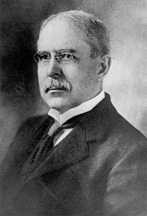George T. Oliver: Difference between revisions
→U.S. Senate: ce |
Bluelink 1 book for verifiability (refca)) #IABot (v2.0.1) (GreenC bot |
||
| Line 23: | Line 23: | ||
==U.S. Senate== |
==U.S. Senate== |
||
In 1909, he was [[United States Senate special election in Pennsylvania, 1909|elected]] to the U.S. Senate to serve out the term of [[Philander C. Knox]], who had resigned to become [[United States Secretary of State|Secretary of State]] under [[William Howard Taft|President Taft]]. Oliver was [[1911 United States Senate election in Pennsylvania|reelected]] to a full six-year term starting in 1911. As senator, he focused on tariff matters affecting the iron and steel industry, the chief employer in Pittsburgh.<ref>{{cite news|title=Ex-Senator Oliver Dies in Pittsburgh|newspaper=[[The New York Times]]|date=23 January 1919|url=https://timesmachine.nytimes.com/timesmachine/1919/01/23/97062230.pdf}}</ref> In 1911, he helped reverse the [[United States Board on Geographic Names]] decision to spell the [[name of Pittsburgh]] without the final ''h''.<ref>{{cite book|last=Stewart|first= George R.|authorlink= George R. Stewart|title=Names on the Land: A Historical Account of Place-Naming in the United States|url= https://archive.org/details/namesonlandhisto0000stew |
In 1909, he was [[United States Senate special election in Pennsylvania, 1909|elected]] to the U.S. Senate to serve out the term of [[Philander C. Knox]], who had resigned to become [[United States Secretary of State|Secretary of State]] under [[William Howard Taft|President Taft]]. Oliver was [[1911 United States Senate election in Pennsylvania|reelected]] to a full six-year term starting in 1911. As senator, he focused on tariff matters affecting the iron and steel industry, the chief employer in Pittsburgh.<ref>{{cite news|title=Ex-Senator Oliver Dies in Pittsburgh|newspaper=[[The New York Times]]|date=23 January 1919|url=https://timesmachine.nytimes.com/timesmachine/1919/01/23/97062230.pdf}}</ref> In 1911, he helped reverse the [[United States Board on Geographic Names]] decision to spell the [[name of Pittsburgh]] without the final ''h''.<ref>{{cite book|last=Stewart|first= George R.|authorlink= George R. Stewart|title=Names on the Land: A Historical Account of Place-Naming in the United States|url= https://archive.org/details/namesonlandhisto0000stew |url-access=registration|origyear=1945|edition=Revised|year=1958|publisher=Houghton Mifflin|page=[https://archive.org/details/namesonlandhisto0000stew/page/344 344]}}</ref> |
||
==Memorial== |
==Memorial== |
||
Revision as of 07:48, 8 June 2020
George Tener Oliver | |
|---|---|
 | |
| United States Senator from Pennsylvania | |
| In office March 17, 1909 – March 4, 1917 | |
| Preceded by | Philander Knox |
| Succeeded by | Philander Knox |
| Personal details | |
| Born | January 26, 1848 County Tyrone, Ireland |
| Died | January 22, 1919 (aged 70) Pittsburgh, Pennsylvania |
| Political party | Republican |
George Tener Oliver (January 26, 1848 – January 22, 1919) was an American lawyer, publisher, and Republican party politician from Pittsburgh, Pennsylvania. He represented Pennsylvania in the United States Senate from 1909 until 1917.
Early life, education, and career
He was born in Dungannon, Ireland while his parents were visiting there.[1] After graduating from Bethany College, West Virginia (B.A., 1868; M.A.,1873) he studied law in an office in Pittsburgh, where he practiced from 1871 to 1881. He then engaged in the iron and steel industry, accumulating a large fortune.[1] In 1900 Oliver separately purchased two Pittsburgh newspapers, the morning Commercial Gazette and evening Chronicle Telegraph, the former of which he merged six years later with The Pittsburg Times to form The Gazette Times.[2]
U.S. Senate
In 1909, he was elected to the U.S. Senate to serve out the term of Philander C. Knox, who had resigned to become Secretary of State under President Taft. Oliver was reelected to a full six-year term starting in 1911. As senator, he focused on tariff matters affecting the iron and steel industry, the chief employer in Pittsburgh.[3] In 1911, he helped reverse the United States Board on Geographic Names decision to spell the name of Pittsburgh without the final h.[4]
Memorial
Oliver owned a summer estate named Dungannon Hall in Hamilton Twp, Ontario, just north of Cobourg. The sideroad south of the estate was named Oliver's Lane in memory. Although Dungannon Hall was lost to fire in the mid 20th Century, the gates to the estate still stand at the western end of Oliver's Lane next to Ontario Street.[5]
References
- ^ a b "Oliver, George Tener". New International Encyclopedia (Second ed.). New York: Dodd, Mead and Company. 1916.
- ^ Fleming, George Thornton, ed. (1916). "Newspapers". Pittsburgh, How to See it. William G. Johnston Company. pp. 169-171.
- ^ "Ex-Senator Oliver Dies in Pittsburgh" (PDF). The New York Times. 23 January 1919.
- ^ Stewart, George R. (1958) [1945]. Names on the Land: A Historical Account of Place-Naming in the United States (Revised ed.). Houghton Mifflin. p. 344.
- ^ Cruickshank, Tom (Summer 2013). "Cobourg's Gilded Age". Watershed. 13 (49). pp. 26-31.
External links
United States Congress. "OLIVER, George Tener (id: O000073)". Biographical Directory of the United States Congress.
- 1848 births
- 1917 deaths
- People from County Tyrone
- Irish emigrants to the United States (before 1923)
- Politicians from Pittsburgh
- American industrialists
- American newspaper publishers (people)
- United States senators from Pennsylvania
- Pennsylvania Republicans
- Republican Party United States senators
- Bethany College (West Virginia) alumni
- Pittsburgh Post-Gazette people
- Burials at Allegheny Cemetery
- 19th-century American politicians
- Journalists from Pennsylvania
- Lawyers from Pittsburgh
- Pennsylvania politician stubs

